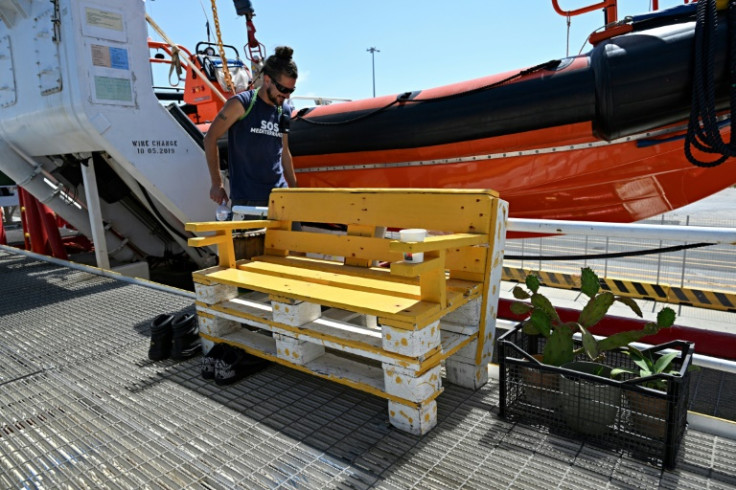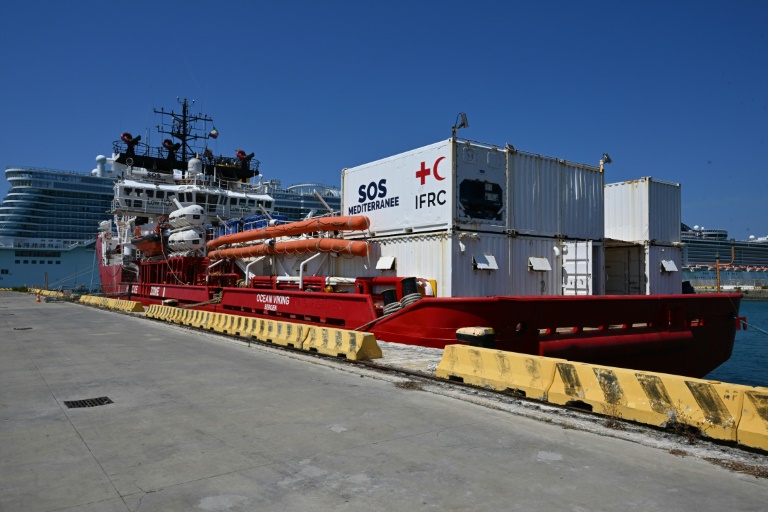AFP
The Ocean Viking should have been on the water Friday, searching for migrants needing rescue in the Mediterranean.
Instead, the vessel operated by Marseille-based SOS Mediterranee was docked at the Civitavecchia port outside Rome due to a bureaucratic bottleneck with Italy that has put it out of commission — leaving more migrants to fend for themselves in open waters.
“We would have been at sea right now,” said SOS Mediterranee spokeswoman Claire Juchat during a tour of the ship for AFP.
“To be honest, it’s a bit tough.”
Stuck at port, a crew member tinkered with an engine while another smoked and looked at his phone.
The Ocean Viking was ordered to Civitavecchia where the 57 migrants it last rescued disembarked.
After a seven-hour inspection Tuesday, port authorities detained the ship over what SOS Mediterranee calls a “restrictive interpretation” of ship safety standards.
Authorities found that there were not enough certified crew members to operate its life rafts, even though it holds more than the required amount of rafts.
The issue had never been raised during seven previous inspections over the past four years, and amounts to the latest roadblock thrown in the charity’s path by Italian authorities, Juchat said.
The Italian coast guard did not respond to AFP’s questions about the inspection.
There was an eerie emptiness on the anchored migrant rescue boat.
Reminders of the absent migrants were everywhere, from the hand-drawn map of the ship’s last itinerary from Libya to Rome, to the sign declaring “You are Safe” outside the women’s sleeping area.
In the middle of the deck is the men’s shelter, a large converted container whose walls are decorated with pictures of giraffes, impalas, zebra and palm trees. Messages to migrants are written in various languages, including Arabic, Bangla and Farsi.
“When we have 400 people we unfortunately have people sleeping here as well,” said Juchat, indicating to the 69-meter-long wooden deck.
Ocean Viking and other ships have faced mounting challenges rescuing migrants this year.
A new law by Italy’s new far-right government in effect since January has forced rescue ships to dock in assigned ports, often far away and requiring days of extra sailing.
That has pushed up the Ocean Viking’s daily fuel costs up to about 26,000 euros ($29,000) per day from a previous 14,000 euros, Juchat said.
Last Friday, during the rescue of 11 migrants, Juchat said the Libyan coast guard — in a vessel donated by Italy — fired shots within close range of an inflatable rescue boat carrying her, other Ocean Viking crew and migrants.
“Our lives are put at risk… we should not be a target,” she said, calling for more transparency and accountability from the Libyan coast guard, to whom the EU is giving “millions, training them and giving them boats”.
“And then we see these boats in the hands of these militias three weeks after,” she said. “It’s like the world upside down. We are rescuers, and (yet) being shot and being detained.”
To the stern of the ship stands a white, innocuous-looking container — the morgue.
From the bow, two enormous cruise liners are visible, docked at a nearby pier.
It’s at the bow where the crew normally takes turns day and night scanning the horizon for migrant boats.
With binoculars and a sharp eye, rescuers can spot a boat up to eight miles away.
“When you find them, you don’t want to lose them,” said Juchat.

AFP







